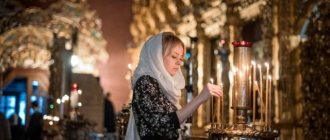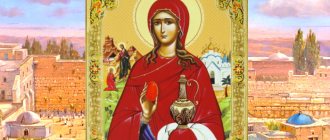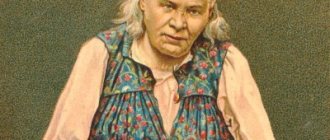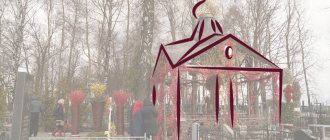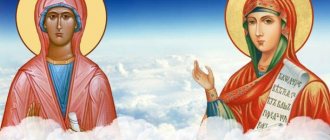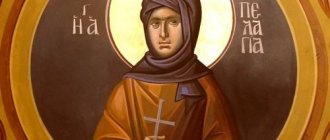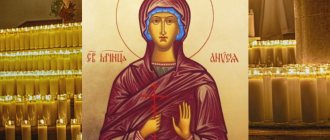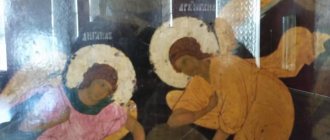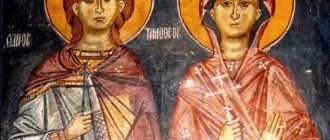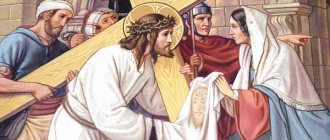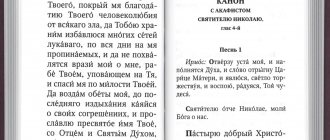Blessed Maria (Fedina) Diveevskaya
Maria Fedina or Diveevskaya is known as the holy fool. From an early age, the girl revered Christ, and then lived to help loved ones and heal parishioners. People spoke about her differently. Foolishness often looked like rudeness and impatience, but in fact Mary showed miracles of humility. Once she lay for six months without moving, then endured her knees being scalded with boiling water, without making a single sound.
The memory of the blessed Diveyevo spread far beyond the borders of the Nizhny Novgorod region. People began to come to her from other cities.
Diveevo became a refuge for the blessed one, but at the same time she herself was drawn to this place from early childhood. It was nice and calm there, so those who needed it were drawn there. The monastery attracted Masha, who lost her family early. The girl left her native place only to come to Sarov. She remained there until the last days of her life.
Life of a saint
Maria Fedina grew up without parents, as they died very early. Maria was born in the 19th century; her small homeland was the village of Goletkovo, which is located in the Tambov region. First, Maria’s father died, then she and her mother moved into the house of their eldest son. But the daughter-in-law did not want to live with them, then she tormented her mother-in-law with nagging. Soon she died too.
Maria attended church with her mother from early childhood. The mentors noted that the girl was quiet and lonely. She preferred reading scripture to games. But they also noted the restlessness of the girl, who could pray frantically for several hours in a row. Then she fell silent and became quiet and indifferent.
After her mother died, Masha overheard several women who were going to Sarov. The girl decided to go with them, so as not to return to her older brother and his wife. Because Masha did not have a home, the girl decided to live wandering. So she walked between Sarov and Diveevo. She was constantly hungry and often wore out her last clothes.
The story tells how one day the blessed woman was walking from Sarov, during Holy Week. There was a lot of water on the streets after the rains. Masha is delirious in knee-deep water. So a man in a cart caught up with her and offered her a ride, but she refused because she had nowhere to go.
When summer came, Maria lived in the forests, so when she came to the Diveyevo service, her body was covered with insect bites and wounds.
The girl found special grace on the territory of the Seraphim-Diveevsky Monastery. The nuns treated her kindly, many loved and pitied her. The nuns regularly provided clean clothes, fed them, and allowed them to wash. A few days later, the poor thing came to them again, in tatters, because her dress had been bitten by dogs, which were set on by the villagers, who could not tolerate the orphan’s foolish appearance.
Gradually, the villagers got used to it and began to notice wonderful oddities. Whatever Maria said, everything began to come true. The blessed one often came running from the forest to warn about something. If at first they did not listen to her, then they began to specifically seek meetings with her in order to find out the future or hear advice.
Diveevo is traditionally called a special region. It’s as if grace lives on. Those who come there to pray then cannot hold back their tears when the time comes to leave. Moreover, there is a real continuity among the blessed. The first old woman of Diveyevo is considered to be Pelageya Serebryannikova, whom Father Seraphim himself invited to live. He asked the old woman to look after the orphans, which the wanderer did until her last breath. At her death, Pelageya blessed Praskovya or blessed Pasha to her post. Maria Ivanovna took the baton from Praskaveya Ivanovna.
From then on, Maria began to live as the Diveyevo schema-montress. At first not everyone loved her, but then they began to respect her. The teacher gave her a separate cell. It was damp and cold there, so the martyr received severe rheumatism. Dorothea began to look after her. One day the nurse went away, and Maria Ivanovna decided to get up herself, but, unfortunately, she did not calculate her own strength. The old woman leaned on her hands and broke her wrists. Fedina completely refused the bandage and medical intervention, and put the brush on the pillow and lay there for six months.
As a result, terrible bedsores formed, which even exposed bones. Maria endured the pain in silence. Later, another terrible event happened to her. Boiling water was poured onto her knees, but Maria again did not make a sound. It is believed that this is how the Lord tested the blessed one. He seemed to give her as much as the blessed one could bear.
According to the stories of the blessed one's contemporaries, which were recorded by nuns, it became known that the Diveyevo holy fool was able to predict the death of the royal family. No one believed her then, but on the night when members of the Romanov family were killed, Maria seemed to go crazy. The old woman swore and screamed loudly, threatened someone, and was about to run away somewhere.
Death came to the blessed one in the fall of 1931. Before this, the blessed one warned her nurse Dorothea that she would not see her death. Dorothea doubted it, since she was constantly with the blessed one. But she had to leave for 10 minutes. During this time, the blessed one died quietly.
Later, the nuns who were present at the death recalled that at the time when Mary was dying, the blessed and holy fool Onesimus rejoiced greatly. He understood that Mary's death would bring her relief.
Her soul will go to heaven. She is destined for peace and tranquility.
Day of Remembrance
In the summer of 2004, Mary was canonized as a saint in the Nizhny Novgorod diocese. And a few months later they compiled a church-wide veneration. The relics of St. Blessed Mary were found in the fall of 2004 at the cemetery of the Bolshoi Cherevatovo Kazan Church of the Searafimo-Diveevsky Monastery. The relics of Pelagia, as well as Paraskovya, rest there. The memory of Blessed Mary is venerated on September 8.
Miracles of healing and holy relics of St. Blessed Mary of Diveyevo
During her lifetime, the blessed one discovered the gift of healing. The first time one of the parishioners complained to her. Her hands were completely covered with boils, thus showing terrible eczema. Maria Ivanovna strongly recommended anointing her hands with oil from the lamp that stood in her cell. At first, the parishioner refused, since the doctors forbade anointing the skin with oils. But, believing the words of the blessed one, she agreed. Healing came the next day.
Troparion, tone 1
To the interlocutor of the Venerable Seraphim, / our wondrous maiden and mother Marfo, / having acquired the life of an equal angel, / you have achieved residence in Heaven, / where you pray for the salvation of our souls.
Kontakion, tone 8
Adorned with meekness and humility/ and filled with Divine love,/ you acquired Heavenly joy,/ the young maiden and our mother Marfo,/ and, in angelic form, from the venerable Having clothed yourself with Seraphim,/ you dwelt with the wise virgins in the Heavenly Palace, // where you prayed for the salvation of our souls.
For Christ's sake, holy fool Maria Ivanovna
Maria Zakharovna Fedina was born in the late 60s or 70s of the 19th century in the village of Goletkovo, Elatemsky district, Tambov province. Her parents, Zakhar and Pelagia Fedina, died early. Her father died when Maria was barely thirteen years old. Pelagia and her daughter had to live in the house of their eldest son. But here they had no life from their daughter-in-law, and they moved to the bathhouse.
This temple is known far beyond Russia. Temple in honor of John Chrysostom in the village of Godenovo.
Maria attended church from childhood, loved solitude, never played with anyone, never had fun, never dressed up, and always dressed in a torn dress that someone had thrown away. At the same time, the girl had a restless character and some oddities. The Lord especially provided for her, knowing her future zeal for spiritual life. During her daily work, she often saw the Seraphim-Diveevo Monastery before her eyes, although she had never been there.
A year after her father’s death, Maria’s mother went to the Lord, and the girl became completely unbearable being with her relatives. One summer, several women and girls gathered in Sarov. Maria asked to go with them and never returned home. Having no permanent shelter, she wandered between Spros, Livnevy and Ardatov - hungry, half-naked, persecuted. She walked, regardless of the weather, in winter and summer, in cold and heat, in floods and in rainy autumn, in the same way - in bast shoes, often torn, without footwear. (Onuchi is a piece of fabric intended for wrapping the foot and lower leg, used in combination with bast shoes or another form of footwear.) So one day she walked to Sarov during Holy Week during the very muddy season - knee-deep in water mixed with mud and snow. A man in a cart caught up with her, took pity on her and offered to give her a ride, but Maria refused. In the summer she apparently lived in the forest; When she appeared in Diveevo, her body was completely covered with ticks, and the wounds from their bites were already opening.
With a group of pilgrims at the holy spring in honor of Alexander Svirsky in the Nikandrov Hermitage, 2-day trip to Pskov.
Maria began to often visit the Diveyevo monastery. Some sisters revered her, feeling that she was an extraordinary person, and gave her clean and strong clothes instead of rags, but after a few days she returned all torn and dirty, bitten by dogs and beaten by evil people. The other nuns did not understand her feat and persecuted her, complained to the police officer about her, and asked him to free them from “this beggar woman.” The policeman took Maria away, but since she was acting like a complete fool, he could not do anything and released her. She continued to wander and often, as if swearing, exposed secret human sins, for which many did not like her.
The photo shows the steps from the miraculous holy spring to the monastery - Intercession-Tervenichesky Convent. A trip to Alexander Svirsky for two days.
No one ever heard from Mary a complaint, a groan, or a complaint about injustice, or noticed despondency or irritability. Often the seemingly inconspicuous humility of the blessed one was hidden under the guise of rudeness. And the Lord Himself glorified Mary among people for her godly life, meekness and patience. Those around her began to notice: whatever she said or warned about came true, and those who stayed with her received mercy from God.
People visiting this temple write letters of request to St. Spyridon of Trimifuntsky, because it is not for nothing that in Solba they call him the heavenly banker. In the photo there is a temple in honor of Spyridon of Trimifuntsky in the Nikolo-Solbinsky convent. Day trip to Godenovo.
In the Seraphim-Diveyevo Monastery there was an amazing continuity of blessed elders. The first of them, Pelagia Ivanovna Serebrennikov, was sent to Diveevo by Father Seraphim, who at a personal meeting said: “Go, take care of my orphans!” Pelagia Ivanovna “took care of the orphans” for forty-seven years and, shortly before her death, she blessed Blessed Pasha (schema-nun Paraskeva), who labored for thirty years in the Sarov Forest, and then almost the same amount of time in Diveevo, to take her place. Maria Ivanovna received spiritual nourishment from Paraskeva Ivanovna and consulted with her. Subsequently, she was asked why she calls herself by her patronymic “Ivanovna” and not “Zakharovna”, and she explained: “We are all blessed ones, Ivanovnas - after John the Baptist.”
Icon of Mary (Fedina) of Diveyevo
In addition to a simple mention, icons were written in the name of veneration of Maria Fedina of Diveyevo. On the canvas, the old woman is depicted waist-deep, her head is covered with a scarf, and the blessed one holds an icon in her hands. People turn to her for healing. During her lifetime, Mary was known for her miraculous gift.
Mothers kneel before the icon, wishing health and well-being for their children. But the blessed one of Diveyevo especially patronizes those who have lost their parents. This is due to the fact that she herself grew up without a father and mother from an early age. That is why Diveevskaya became a holy fool. She had to wander, live in hardships, endure misfortunes. This is how her humility was forged.
Onega Holy Trinity Cathedral
Maria Zakharovna Fedina was born in the village of Goletkovo, Elatemsky district, Tambov province. Subsequently they asked her why she was called Ivanovna. “This is all of us, blessed ones, Ivanovnas according to John the Baptist,” she answered. Her parents Zakhar and Pelageya Fedyna died when she was barely thirteen years old. The father died first. After the death of her husband, Pelageya settled with Masha in the family of her eldest son. But here they had no place to live from their daughter-in-law, and they moved to a bathhouse. Since childhood, Maria was distinguished by a restless character and many oddities, she often went to church, was silent and lonely, never played with anyone, did not have fun, did not dress up, was always dressed in a torn dress, abandoned by someone. The Lord especially provided for her, knowing her future zeal for God, and during her work she often saw the Seraphim-Diveyevo Monastery before her eyes, although she had never been there. A year after the death of his father, his mother died. Here she completely lost her life from her relatives. One summer, several women and girls gathered to go to Sarov, Maria asked to go with them. She never returned home. Having no permanent shelter, she wandered between Sarov, Diveevo and Ardatov - hungry, half-naked, persecuted. She walked, regardless of the weather, in winter and summer, in cold and heat, in low water and in rainy autumn, in the same way - in bast shoes, often torn, without footwear. Once I was walking to Sarov during Holy Week in the middle of a muddy road, knee-deep in water mixed with mud and snow; A man in a cart caught up with her, took pity on her and called her for a ride, but she refused. In the summer, Maria apparently lived in the forest, because when she came to Diveevo, her body was completely covered with ticks, and many of the wounds had already opened. Most often she visited the Seraphim-Diveevo Monastery; some sisters loved her, feeling that she was an extraordinary person; They gave clean and strong clothes instead of rags, but after a few days Maria came again, all torn and dirty, bitten by dogs and beaten by evil people. Some nuns did not understand her feat, did not like her and persecuted her, went to complain about her to the police officer, so that he, with the authority given to him, would free them from this “beggar woman,” lousy and rude. The policeman took her away, but could not do anything, because she seemed like a complete fool, and he let her go. Mary again went to people and often, as if swearing, denounced them of secret sins, for which many especially did not like her. No one ever heard from her a complaint, a groan, despondency, irritability or lamentation about human injustice. And the Lord Himself, for her godly life and greatest humility and patience, glorified her among the inhabitants. They began to notice: whatever she says or warns about comes true, and those who stop receive grace from God. One woman, Pelageya, had twelve children, and all of them died before the age of five. In the first years of her marriage, when her two children died, Maria Ivanovna came to their village, went to the windows of her house and sang: “Little hen, give birth to a few children.” The women around her tell her: “She doesn’t have any children.” And she answers them: “No, she has a lot.” They insist: “She doesn’t have anyone.” Then Maria Ivanovna explained to them: “The Lord has a lot of space.” One day she says to one woman: “Go, go quickly, Nucharovo is burning.” And the woman was from Ruzanov. I came to Ruzanovo, everything was in place, nothing happened; stood up in bewilderment, and at that time they shouted: “We’re burning.” And all of Ruzanovo burned out from end to end. Maria Ivanovna received spiritual nourishment from Blessed Praskovya Ivanovna, with whom she came to consult. Praskovya Ivanovna herself, sensing her death, told her loved ones: “I’m still sitting behind the camp, and the other one is already scurrying around, she’s still walking, and then she’ll sit down,” and Maria Ivanovna, having blessed her to stay in the monastery, said: “But don’t sit in my chair.” sit down” (Maria Ivanovna lived in the cell of Blessed Pasha for only two years). On the very day of the death of blessed Pashenka of Sarov, Maria Ivanovna had a small temptation. Annoyed by her oddities, the nuns kicked her out of the monastery, not ordering her to come here at all, otherwise they would resort to the help of the police. The blessed one said nothing to this, turned and left. Before the coffin with the body of Blessed Pasha was brought into the church, a peasant came to the monastery and said: “What servant of God you drove out of the monastery, she just told me my whole life and all my sins.” Return her to the monastery, otherwise you will lose her forever. Messengers were immediately sent for Maria Ivanovna. She did not keep herself waiting and returned to the monastery at a time when Praskovya Ivanovna was lying in a coffin in the church. The blessed one entered and, turning to the senior sacristan nun Zinovia, said: “Look, put me in the same way, just like Pasha.” She got angry with her, how dare she compare herself to Pasha, and answered her boldly. Maria Ivanovna said nothing. Since then, she finally settled in Diveevo. At first she lived with the nun Maria, and then the abbess gave her a separate room. The room was cold and damp, especially the floor; the blessed one lived in it for almost eight years; Here she finally lost her legs and acquired severe rheumatism throughout her body. Almost from the first year of her life in the monastery, Pasha (Dorothea in monasticism) was assigned to her as a novice, who at first did not like Maria Ivanovna and went to serve her for obedience. Maria Ivanovna had said even before that Pasha would be brought to serve her. Pasha grieved greatly, seeing how Maria Ivanovna gradually acquired a painful illness and lost her legs, but she could not do anything. Only when there were so many people coming to the blessed one that it was impossible to fit in the cramped room, the abbess allowed her to be transferred to the house of Pasha of Sarov. This house stood right at the gate, and the Soviet authorities, seeing a large crowd of people, initiated persecution against the blessed one, so that in the end she was transferred to a separate room at the almshouse, where she lived until the monastery was closed. Blessed Maria Ivanovna spoke quickly and a lot, sometimes very fluently and even in poetry, and cursed heavily, especially after 1917. She cursed so much that the nuns went outside to avoid hearing. Praskovya Ivanovna’s cell attendant Dunya once asked her: “Maria Ivanovna, why are you swearing so much?” Mama didn’t swear like that. “It was good for her to indulge under Nikolai, but indulgence under the Soviet regime.” The blessed one was not content with the exploits of her previous wandering life, illness, prayer, and receiving people. One day, Maria Ivanovna’s novice, Dorofey’s mother, went to the pantry for milk, quite far from the old woman’s cell, and served a hot samovar on the table. He returns and hears Maria Ivanovna’s frantic cry: “Guard!” The confused novice at first did not understand anything, and then she sat down in horror. In her absence, Maria Ivanovna decided to pour herself some tea and opened the tap, but failed to turn it on, and the water poured into her lap until Dorofea’s mother arrived. She was scalded to the bones, first all over her front and legs, and between her legs everything was completely covered with blisters, then it broke through and began to get wet. This happened in the heat of the day, in June. Dorothea was afraid that worms would appear in the exposed and unhealed meat, but the Lord protected His chosen one, and by what miracle she recovered, only God knows. Without getting out of bed, she urinated on herself, everything was rotten, she lay without oilcloth, it was difficult to lift her and change under her, and yet she recovered. Another time, Dorothea was tired to the point of exhaustion, raising Maria Ivanovna all night and all for a minute; In the morning she became so weak that she said: “As you wish, Maria Ivanovna, I can’t get up, do whatever you want.” Maria Ivanovna became quiet, and suddenly Dorothea woke up from a terrible roar: the blessed one herself decided to get down, but she got up in the wrong direction in the dark, fell with her hand on the table and broke it in her hand. She shouted: “Guard!”, but did not want to call the doctor to tie her hand in a splint, but put it on the pillow and lay for six months in one position, without getting up or turning around. I urinated on myself again because I drank a lot and ate almost nothing. Her bedsores became so severe that her bones were exposed and her flesh hung in shreds. And again Maria Ivanovna endured all the torment without complaint, and only six months later the arm began to grow together and grew together incorrectly, as can be seen in some photographs.Butovo training ground - Russian Golgotha
Blessed Paraskeva of Diveevskaya (1795-1915) Blessed Pasha of Sarov (in the world - Irina) was born in 1795 in the village of Nikolskoye, Spassky district, Tambov province, into the family of a serf. At seventeen she was married off. Her husband's family loved her for her gentle disposition and hard work. Fifteen years have passed. The Bulgin landowners sold Irina and her husband to the Schmidts.
Soon Irina's husband dies. The Schmidts tried to marry Irina a second time, but when they heard the words: “Even if you kill me, I won’t marry again,” they decided to leave her at home. Irina did not have to work as a housekeeper for long, she was slandered by the servants, the owners, suspecting Irina of theft, gave her to the soldiers to torture. After severe beatings, unable to bear the injustice, Irina left for Kyiv.
The fugitive was found in the monastery. For escaping, the serf peasant woman had to languish in prison for a long time before she was sent to her homeland. Finally, Irina was returned to her owners. After working as a gardener for the Schmidts for two years, Irina again decided to escape. It should be noted that during the second escape, Irina secretly took monastic vows with the name of Paraskeva, having received the blessing of the elders for the foolishness of Christ.) Soon the blessed one was detained by law enforcement officers and returned to her owners, who soon kicked Irina out themselves.
For five years, Irina, half-naked and hungry, wandered around the village, then for 30 years she lived in the caves she dug in the Sarov Forest. The surrounding peasants and pilgrims who came to Sarov deeply revered the ascetic and asked for her prayers. They brought her food, left her money, and she distributed everything to the poor.
The life of a hermit was fraught with great dangers; it was not so much the proximity to wild animals in the forest that complicated Irina’s life, but rather the meeting with “unkind people.” One day she was severely beaten by robbers who demanded money from her, which she did not have. For a whole year she was between life and death.
She came to the Diveyevo Monastery in the fall of 1884, approaching the gates of the monastery, she hit the pillar and predicted: “As soon as I crush this pillar, they will begin to die, just have time to dig graves.” Soon Blessed Pelageya Ivanovna Serebrennikova (1809-1884), to whom the reverend himself died, died. Seraphim entrusted his orphans, the monastery priest died after her, then one after another several nuns...
Archimandrite Seraphim (Chichagov), author of the Chronicle of the Seraphim-Diveyevo Monastery, said: “During her life in the Sarov Forest, her long asceticism and fasting, she looked like Mary of Egypt. Thin, tall, completely burned by the sun and therefore black and scary, she wore short hair at that time, since previously everyone was amazed at her long hair that reached the ground, giving her a beauty that bothered her in the forest and did not correspond to her secret tonsure. Barefoot, in a man's monastic shirt - a scroll, unbuttoned on the chest, with bare arms, with a serious expression on her face, she came to the monastery and struck fear into everyone who did not know her "...
Contemporaries noted that the appearance of Blessed Pasha of Sarov changed depending on her mood; she was either overly strict, angry and menacing, or affectionate and kind: “Her childish, kind, bright, deep and clear eyes amaze so much that any doubt about her purity disappears.” , righteousness and high feat. They testify that all her oddities - allegorical conversation, severe reprimands and antics - are just an outer shell that deliberately hides humility, meekness, love and compassion."
The blessed one spent all nights in prayer, and during the day after church services she reaped grass with a sickle, knitted stockings and did other work, constantly saying the Jesus Prayer. Every year the number of sufferers who turned to her for advice and requests to pray for them increased.
Eyewitnesses said that Praskovya Ivanovna lived in a small house to the left of the monastery gate. There she had one spacious and bright room, in which the entire wall opposite the door “was covered with large icons”: in the center - the Crucifixion, on the right the Mother of God, on the left - the apostle. John the Theologian. In the same house, in the right corner from the entrance, there was a tiny cell - a closet that served as Praskovya Ivanovna’s sleeping room, where she prayed all night long. Exhausted in the morning, Praskovya Ivanovna lay down and dozed...
Pilgrims crowded under the windows of her house all day long. The name of Praskovya Ivanovna was known not only among the people, but also in the highest circles of society. Almost all of the high-ranking officials, visiting the Diveyevo Monastery, considered it their duty to visit Praskovya Ivanovna.
The blessed one answered thoughts more often than questions. People came to the blessed one for advice and consolation in an endless procession, and the Lord, through His faithful servant, revealed the future to them and healed mental and physical ailments. Here is an excerpt from the memoirs of one Moscow correspondent who was lucky enough to visit the blessed old woman: “...We were amazed and delighted that this blessed woman with the pure gaze of a child prayed for us sinners. Joyful and satisfied, she sent us off in peace, blessing us on our way. She made a strong impression on us. This is an integral nature, untouched by anything external, who has given her entire life, all her thoughts to the glory of the Lord God. She is a rare person on earth, and we must rejoice that the Russian land is still rich in such people.”
From the memoirs of nun Serafima (Bulgakova): “At the end of the 19th century, the future Metropolitan Seraphim, then still a brilliant guards colonel Leonid Chichagov, began to visit us in Sarov... When Chichagov arrived for the first time, Praskovya Ivanovna met him, looked from under his sleeve and said : “But the sleeves are priestly ones. He soon accepted the priesthood. Praskovya Ivanovna persistently told him: “Submit a petition to the Emperor so that the relics are revealed to us. Chichagov began collecting materials, wrote “The Chronicle...” and presented it to the Emperor. When the Emperor read it, he was inflamed with the desire to open the relics”...
Archimandrite Seraphim (Chichagov) said the following about his first meeting with the blessed old woman: “I was taken to the house where Pasha lived. As soon as I entered her, Pasha, who was lying on the bed (she was old and sick), exclaimed: “It’s good that you came, I’ve been waiting for you for a long time: St. Seraphim ordered me to tell you to report to the Emperor that the time of opening has come of his relics and glorification. I answered Pasha that due to my social status I could not be accepted by the Emperor, and I could not convey to him what she was entrusting me with...
In confusion, I left the old lady’s cell... Soon I left the Diveyevo Monastery and, returning to Moscow, involuntarily pondered the words... And suddenly one day the thought struck me that it was possible to write down everything that the nuns who remembered him said about St. Seraphim, to find other persons from his contemporaries the monk and ask them about him, get acquainted with the archives of the Sarov Hermitage and the Diveyevo Monastery... Bring all this material into a system and chronological order, then print this work... and present it to the Emperor, which will fulfill the will of the Reverend, conveyed to me in categorical form by Pasha”...
Emperor Nicholas II and Empress Alexandra Feodorovna came to the house of Blessed Pasha of Sarov in 1903, after the canonization of St. Seraphim. Before the guests arrived, Blessed Pasha ordered all the chairs to be taken out and seated the imperial couple on the carpet. The blessed old woman predicted the birth of an heir, warned about the upcoming persecution of the Church, about the death of the Romanov dynasty. After this, the Emperor often turned to Blessed Paraskeva Ivanovna, sending the Grand Dukes to her for advice. Shortly before her death, the blessed one often prayed in front of the portrait of the Emperor, foreseeing his imminent martyrdom.
From the memoirs of Hegumen Seraphim Putyatin: “The great ascetic and seer, Sarovskaya Praskovya Ivanovna... predicted the storm approaching Russia. She placed portraits of the Tsar, Queen and Family in the front corner with the icons and prayed to them along with the icons, crying out: “Holy Royal Martyrs, pray to God for us.”
In 1915, in August, I came from the front to Moscow, and then to Sarov and Diveevo, where I was personally convinced of this. I remember how I served the Liturgy on the feast of the Dormition of the Mother of God in Diveevo, and then went straight from the church to Elder Praskovya Ivanovna, staying with her for more than an hour, listening carefully to her future menacing predictions, although expressed in parables, but her cell attendant and I all understood well and deciphered the unclear. She revealed a lot to me then, which I then did not understand as I should have in the current world events. She told me even then that our enemies started the war with the goal of overthrowing the Tsar and tearing Russia apart. For whom they fought and in whom they hoped, they will betray us and will rejoice in our grief, but their joy will not last long, for they themselves will have the same grief.
The seer kissed the portraits of the Tsar and his family several times in front of me, placed them with icons, praying to them as holy martyrs. Then she wept bitterly... Then the old woman took the icons of the Tenderness of the Mother of God, before whom the Monk Seraphim died, blessed the Sovereign and the Family in absentia, gave them to me and asked me to forward them. She blessed the icons of the Sovereign, Empress, Tsesarevich, Grand Duchesses Olga, Tatiana, Maria and Anastasia, Grand Duchess Elisaveta Feodorovna and A. A. Vyrubova. I asked to bless the icon of Grand Duke Nikolai Nikolaevich, she blessed, but not the Tenderness of the Mother of God, but St. Seraphim. She didn’t bless anyone else with icons... Nowadays it’s clear to me: she knew that they would all end their lives as righteous martyrs. Kissing the portraits of the Tsar and Family, the seer said that these were her dear relatives, with whom she would soon live together. And this prediction came true. She died a month later, passing into eternity, and now, together with the Royal Martyrs, she lives in a heavenly, quiet haven. (1920)”
Blessed Schema-Nun Paraskeva died on October 5, 1915 at the age of 120. Blessed Elder Paraskeva Ivanovna was buried at the altar of the Trinity Cathedral of the Diveyevo Monastery next to Blessed Pelagia Ivanovna. Before her death, Blessed Paraskeva blessed her successor, Blessed Maria Ivanovna, to live in the Diveyevo monastery.
Blessed Maria Diveevskaya (+1931) Blessed Maria (Maria Zakharovna Fedina) was born in the village of Goletkovo, Elatomsky district, Tambov province, into a peasant family. Since childhood, Maria loved solitude and prayer. Maria's father died when she was thirteen years old, and a year later her mother Pelageya also died. Orphaned at the age of 14, she wandered between Diveevo and Sarov, hungry, half-naked, and later settled in the Diveevo monastery.
Blessed Praskovya Ivanovna, anticipating her death, said: “I am still sitting behind the camp, and the other one is already scurrying around, she is still walking, and then she will sit down.”
On the day of the death of Blessed Paraskeva of Sarov, the nuns kicked Blessed Maria out of the monastery, annoyed by her oddities.
However, having heard the peasant’s story, testifying to the insight of blessed Mary (she told him his whole life and pointed out all his sins), they listened to the latter’s request: “Return the servant of God to the monastery.” Messengers were immediately sent for Maria Ivanovna.
During her first years at the monastery, Blessed Mary lived in a cold, damp room. Here, as blessed Praskovya Ivanovna predicted, she lost her legs - “she developed rheumatism.” Blessed Mary was looked after by the nun Dorothea. Once, when Dorofey’s mother went to the pantry for milk, the blessed one was scalded with boiling water “to the bones” - she tried to pour tea for herself, opened the tap of the samovar, but could not turn it on. The patient's suffering was aggravated by the heat; this happened on a hot June day.
According to the testimony of Blessed Mary’s contemporaries, no one ever heard a complaint or a groan from her; it must be for her patience and humility that the ascetic was awarded the Gifts of the Holy Spirit.
According to the testimony of contemporaries, Maria Ivanovna not only predicted, denounced, but through her prayers, the Lord repeatedly healed the suffering, about which eyewitness accounts have been preserved. Let's list just a few of them.
One nun, suffering from a skin disease, after numerous visits to doctors, became despondent: her hands were covered with ulcers, ointments did not help. Maria Ivanovna suggested anointing the wounds with oil from the lamp; after the nun anointed her hands twice, the wounds healed, even the marks disappeared.
A similar testimony has been preserved about the healing of a woman named Elena from an eye disease.
From the memoirs of nun Seraphima: “When I entered the monastery in 1924, abscesses appeared on my hands due to thinness. I tried to anoint them with lamp oil from the relics, but still did not receive healing. I went to Maria Ivanovna to tell about this. She answered: “How do you apply it? Just? Apply a cross and surround.” I smeared it on, and that’s how it went”...
During the years of difficult revolutionary trials for Russia, the flow of those in need of guidance and prayerful help increased. The prophecies and predictions of the blessed old woman helped many people avoid death and find the right path in difficult circumstances.
From the memoirs of nun Seraphima (Bulgakova):
— Blessed Maria Ivanovna was from Tambov. During her lifetime, Elder Paraskeva Ivanovna walked around in tatters, dirty, and spent the night under a bridge. Her real name was Zakharovna, not Ivanovna. We asked why she is called Ivanovna? She answered: “These are all of us, blessed ones, Ivanovnas - according to John the Baptist”... Blessed Maria spoke a lot and quickly, and so smoothly, even in poetry... I note that Maria Ivanovna, as a resourceful person, also had a sharp mind, and she loved to surprise of people. One day some military official came to Maria Ivanovna and wanted to come in. It was Soviet times, Dorofey’s mother warned Maria Ivanovna: “A strict man has arrived, don’t say anything in front of him in vain!” Don’t say anything about the Tsar... As soon as the “strict” one entered, she burst out and began to feel: - When Nikolashka ruled, there was cereal and porridge... And now there is a new regime - we are all lying hungry... Mikhail P. Artsybushev was devoted to the blessed with all his soul, and as director I didn’t do anything in the Astrakhan fisheries without her blessing. So, the doctors prescribed iodine for him. He took it and asked Maria Ivanovna what to do? She replied: “Iodine burns the heart, drink potassium iodide.” Somehow after his departure... the sisters... pestered the blessed one, approaching her with the same question: how does he live, how does he feel? To which she said: “Our Mishenka got in touch with a gypsy girl”... When he came to Diveevo again a year later, the sisters decided to ask Mikhail Petrovich about the “gypsy woman”. In response, Mishenka burst into laughter. Then he said: “What a blessed one!” I hadn’t smoked for many years, but then I was tempted and bought “Gypsy” cigarettes at a stall... Even in the monastery, I heard from the blessed one: “And you will wander around Moscow.” And you, mother, will be sent away.
And when I wandered around Moscow after the dispersal of the monastery, I knew very well: they would soon deport me. And so it happened...
According to the testimony of nun Seraphima, Vladyka Seraphim Zvezdinsky revered blessed Mary as “the great servant of God”...
The blessed old woman said in 1926: “What a year is coming, what a difficult year! Elijah and Enoch are already walking on earth.” And when searches began in the monastery after Easter, to the question of nun Seraphima: “Will we still live in peace?” She replied that there were only three months left.
On September 7/20, 1927, the nuns were asked to leave the monastery. After the closure of the monastery, Maria Ivanovna lived in the houses of believers. Representatives of the authorities forbade the blessed one to receive visitors. Once the blessed old woman was arrested, but after interrogation, recognizing her as abnormal, she was released.
It should be noted that although Maria Ivanovna warned the sisters about future trials during the years of godlessness: camps, exile, she at the same time confidently predicted the revival of the Seraphim-Diveevsky Monastery, which came true in 1991.
The blessed old woman died in 1931 at the age of about 70 years, she was buried in the cemetery of the village of Bolshoye Cherevatovo.
Numerous testimonies have been preserved of miraculous healings through the prayers of the blessed elders, which have occurred in our days.
The Synodal Commission for the Canonization of Saints, having become familiar with the godly life of Christ for the sake of the blessed elders Pelagia, Paraskeva and Maria Diveevskaya, decided to canonize Christ for the sake of the holy fools, blessed elders Pelagia Diveevskaya, Paraskeva Diveevskaya and Maria Diveevskaya for local church veneration in the Nizhny Novgorod diocese. The holy elders were glorified as locally revered saints in July 2004 during celebrations dedicated to the 250th anniversary of the birth of St. Seraphim of Sarov. (September 22/October 5 - Memorial Day)
Blessed Elders of the Diveyevo Monastery, Moscow, Publishing house: “Pilgrim”, 2004.
Teacher of monks. Blessed Elder Schema-Nun Maria (Matukasova)
The last years of the life of the blessed schema-nun Maria (Matukasova †January 14, 2000) were associated with the Optina Monastery. If earlier her feat as a holy fool for Christ’s sake took place “in the south,” then after accepting the schema in January 1998, the old woman began to carry out a different ministry - prayer books for the whole world and, according to the word of magnification to the venerable ones, “mentor of monks and interlocutor of angels.” Hierodeacon Alexander (Matyukhin), a resident of the Holy Vvedenskaya Optina Hermitage, a spiritual writer, and the author of a recently published book about the modern ascetic, Elder Nikolai Diveevsky, talks about this period of her life.— Do you think Maria Ivanovna was received in Optina Pustyn as a man of God?
“Mother Maria herself answered this question when she left our monastery before her death... Some accepted her, others did not... There are sincere admirers of the old woman, and there are many of them. But there was apparently still no general “acceptance” of her predictions and advice, when they were not only listened to, but also fulfilled.
But no matter how anyone treated mother, many of us had the feeling that the entire situation in the monastery was controlled by Schema-nun Maria. She sat calmly in her chair, apparently did not interfere in anything, “belittled” herself in every possible way, and yet the whole situation was in her hands. With the arrival of the old woman to us, the microclimate in the monastery improved noticeably.
—What was the service of Schema-nun Maria in your monastery?
— Elder Nektarios said: “Look for great meaning in everything.” Mother Maria first came to Optina Pustyn for the feast of the Nativity of the Blessed Virgin Mary. The Mother of God brought her to us. Mother Mary herself spoke about this more than once, because she was a novice of the Mother of God. And about Optina Pustyn the old woman said this: “There is a lot of bread here (grace), but there are so many holes...” So she came to us to patch up these holes... “I plant one seed at a time. And then the bread will grow and they will cut everything off with a sickle...” she said. And her service in the monastery was peacekeeping. My confessor, the famous elder Archimandrite Kirill (Pavlov), told me about this. Before we brought Elder Maria to him, Father Kirill and I had a conversation. He asked me about mother, and after meeting her he said: “Mother came to you as a peacemaker.”
Elder Maria came to the monastery to remind us of gospel poverty. At that time, we in the monastery were very interested in construction and material strengthening of the monastery. And she tried to direct our hearts and eyes to internal construction, the construction of the temple of her soul. When monks came to her, she often said: “Are you reading a book? Read the book...” The old woman wanted to tell us with this: “Do you honor the Gospel? And if you honor it, then you must live according to the Gospel...” She gave us the Gospel and asked us to read several chapters aloud. The Monk Niphon of Cyprus wrote: “All the evil in the world comes from ignorance of the Scriptures.” And Elder Maria reminded us of this.
— Before Mother Maria’s arrival in Optina Monastery, not far from the monastery, in the village of Klykovo, another old woman, schema-nun Sepphora, labored. Was her ministry also connected with the monastery?
“When schema-nun Zipporah died, Mother Maria said: “The old woman went to heaven and took all the bread.” This means that there was no one to care for the monastery. Schema-nun Sepphora, like Maria Ivanovna later, made every effort to ensure that the brethren of the monastery turned their attention to internal work, and not just to external construction.
“The prophecy of Elder Sipporah is known that after her in Optina Hermitage there will be another old lady, larger than her...
— On the eve of the six-month anniversary of the death of Schema-nun Sepphora, the new cellarer of the monastery refused to provide food for the funeral of the old woman. Panteleimon's mother turned to Maria Ivanovna and asked for her prayers so that the funeral, even if poor - with jelly and porridge - would still take place with the modest rubles of the old woman's admirers. “There will be a good wake, a beautiful wake...” Elder Maria answered mysteriously. And at night, a certain servant of God, a devotee of Elder Zipporah, arrived and brought a lot of food. When we arrived in Klykovo, we sat down at the funeral table, we were amazed at the abundance of dishes. Even a monastery could not have organized such a rich funeral. Balyk cutlets, balyk in soup... It turned out to be a “beautiful wake”...
— Do you remember any important prophecies of the blessed schema-nun Maria?
“The old woman undoubtedly possessed a prophetic gift. But she did not always answer questions directly - as a rule, they were parables, allegories... In front of me, Elder Archimandrite Kirill asked her: what awaits us? She answered with a parable: “Water, sand, clay... They sculpt bricks, adjust brick to brick, the Russian stove is warm, warm... There is a lot of bread and rolls...” What did the old woman mean? Maybe persecution, exile... God knows. I told her (I was a cellarer at the monastery at the time): “Mother, maybe we should stock up on canned food?” - “Stock up on prayer!” - answered the old woman.
— Have you personally felt the grace-filled power of the old woman’s prayers?
“When I began to have severe sorrows, my mother helped me a lot. It was hard for me, I couldn’t find peace anywhere... I came to my mother. She was sleeping at that time (and actually praying). One of the Samara residents who was with her at that time brought me some potatoes that my mother had not eaten. And he says to me a little embarrassed: “Mother said that a man is coming, he needs a “doctor”, and we need to give him this to eat.” I ate the potatoes and... calmed down. It was as if I had taken a very strong sedative pill. So mother helped me withstand the enemy’s attack. Then I came to her again with tears in my eyes. And she moves her rosary, prays. She lay down on the bed so that her head hung in the air. She’s tense, she’s shaking all over. She stood up and said: “Well, that’s it!..” Then she quietly added: “So lose your temper!” - about my condition. From that moment on, the temptation waned and was finally smoothed out on the day of Mother Mary’s death. And it even seemed to me that she lived as if to finally rescue me from trouble, to rescue me from the clutches of the enemy...
— Do you know the old woman’s predictions that have already come true?
- A lot of them. I'll give just one example. Last year, three Japanese hieromonks came to us in Optina for the Dormition of the Mother of God - Peter, Daniel and Seraphim. In church at the all-night vigil, I asked my mother, which of them will become Metropolitan of Japan? - "Three!" - answered the old woman. I objected to her: “How can it be, mother. Surely there should be one? “Three!..” the old woman answered again. I began to argue with her, so much so that I even drove her out of patience. She “knocked him on the head”, denouncing him for his foolishness, and said: “Daniel.” Then I went to Father John, the head of the Mission, and reported the old woman’s prediction. It was not Daniel who was elected Metropolitan, but Peter, the most experienced and oldest of the Japanese priests. But soon he died and the question of the Metropolitan of Japan, the head of the Japanese Autonomous Orthodox Church, began to be resolved again. At this time, His Holiness Patriarch Alexy II already became aware of the old woman’s words that Daniel would become Metropolitan. He decided to appoint him Metropolitan of Tokyo and All Japan... Perhaps the third hieromonk, Seraphim, will also eventually become the Japanese Metropolitan...
- Now about something else. It is known that Optina Pustyn raised its voice against the widespread introduction of TIN. A report on this topic was submitted by the abbot of the monastery, Archimandrite Vincent, to His Holiness Patriarch Alexy II. What did the Optina residents see as the main danger of “identification”?
— The famous elder monk Sergius from the city of Mineralnye Vody said that those who accept the INN will lose the ability to repent... Mother Maria also secretly spoke to us about this threat and warned us that difficult trials await us. I will tell you about one incident that became known to many in our monastery. It looks like a parable, and yet it all happened in reality. One woman lived with her daughter in perfect harmony. Then she accepted the TIN. And when I came home from the tax office, I immediately quarreled with my daughter, so much so that they had a complete breakdown in their relationship. The daughter left home and hated her mother. And at first the mother could not understand what was happening. Then they explained to her that all this happened because of the acceptance of the “number”. They taught me that I need to go to the tax office again and write a refusal of the TIN. And finally, she went to the tax office and... saw her daughter on the steps of the inspectorate, filling out an application form to accept a “number”. She began to persuade her daughter not to do this! Finally she came to a real understanding of what had happened to them. After all, there was love between her and her daughter, and after the “identification” everything immediately went wrong... The relationship between them has not improved even now, but the real reason for the breakup has become known. After all, this situation, when a daughter rebelled against her mother, is one of the signs of the Apocalypse, announced in the Gospel (Mark 13:12): “Brother will betray brother to death, and father will betray children; and the children will rise up against their parents and kill them.”
Another situation. A woman in a big city believed in God and decided to serve the Church entirely. She quit her previous job and went to work in the temple. And so the rector ordered everyone to accept the Taxpayer Identification Number. She listened to the priest and also accepted the “number”. When I was in this temple and found out about this, I began to say that accepting an INN is detrimental to the soul, this woman suddenly began to sob and began to almost tear out her hair. They calmed her down, saying that the “number” wasn’t scary, it wasn’t a seal... And she answered them: “No, this number is scary! And you ruined me... I came to the Church to be saved, and so... When I accepted the Taxpayer Identification Number, my daughter and I were immediately kicked out of the apartment. We huddled in the corners, and when we rented another apartment, the ceiling collapsed on us!” The Lord admonishes those who stumble through suffering.
— What would you advise those believers who, out of ignorance, have already accepted a tax identification number?
— I would compare accepting a tax identification number to walking on thin ice. Sooner or later this ice will break off under the weight of the body. And therefore, it is best to stop where you are now and try to go back. Those who accepted the “number” do not need to use it and, of course, need to write a statement refusing it.
— The “secret” of the TIN remains not fully understood. We all see that the Lord retreats from “identified” people. We give our explanations for this. And yet there are more questions than answers...
— The main thesis of the New Age is “no one is above the law.” Nobody... It sounds attractive, but if you think about it, it becomes obvious that we are being returned to the state that triumphed at the time of the Crucifixion of the Lord Jesus Christ. He was crucified as a "lawbreaker." After all, He declared: “Man is not made for the Sabbath, but the Sabbath is for man.” That is, not man for the law, but law for man... The saints, the people of the New Testament, who have been cleansed of passions, no longer need the law to the same extent as unpurified, vicious people. After all, sinners need the law so that their shackles do not fall off until a person is transformed by the grace of the Holy Spirit... And so they want to return us from grace to the law again. And everyone who accepts the TIN, along with it, accepts this rejection of grace in the name of the “law.” That is, it subscribes to the name for which the Lord Jesus Christ was crucified... That is why grace retreats from those who accept the “number”...
- It’s easy to become despondent from all this... Such severe temptations have approached each of us!
“Maria Ivanovna said more than once that for a short time the Lord will give us a Tsar. I believe that these words of hers will come true. So there is no need to despair... Pray, believe and know: the King is Coming!
Anton Zhogolev
17.11.2000
